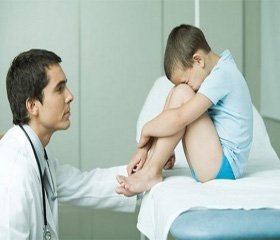Журнал «Здоровье ребенка» 7 (50) 2013
Вернуться к номеру
Rehabilitation features of orphanages inmates with severe neurological-and-behavioral retardation
Авторы: Filkina O.M., Pykhtina L.A., Nazarov S.B., T. Shaninа T.G., Vorobyova E.A., Kocherova O.U., Dolotova N.V.
Рубрики: Педиатрия/Неонатология
Разделы: Клинические исследования
Версия для печати
Introduction. Perinatal hypoxic-ischaemic encephalopathy is a major cause of health problems of little children. Orphanages inmates take a special position among these groups of children. According to the literature, almost all orphanages inmates (98%), growing in a "lack of communication", have a complex health problems and the neurological-and-behavioral retardation despite of good nutrition and medical care. These facts determines the necessity of finding the new complex rehabilitation ways of these patients.
Materials and methods. 208 orphanages children from 1 to 3 years, who had a mild or moderate perinatal hypoxic-ischaemic encephalopathy were observed. This group excluded children without perinatal asphyxia and with severe perinatal hypoxic-ischaemic encephalopathy, clinical manifestations of intrauterine infection, malformations, mental deseases, visual and hearing impairment, prematurity less than 36 gestational weeks, genetic disorders and intrauterine growth retardation. Little children were classified depending on the level of neurological-and-behavioral development: children with normal neurological-and-behavioral development, children with moderate neurological-and-behavioral retardation (developmental delay of two epicrisis terms), with severe neurological-and-behavioral retardation (developmental delay of three or more epikriznyh term). The complex clinical, functional and biochemical assessment were performed to determine the children health state.
Results and discussion. We have found that the base of severe neurological-and-behavioral retardation in orphanages inmates, who had perinatal hypoxic-ischaemic encephalopathy, is a chronic psycho-emotional stress. It could be observed in emotional stress, autonomic regulation tension and overtension, the hypothalamic-pituitary-adrenic and sympathetic nervous system tension, reduction of thyroid gland functional activity and the stresslimiting hormone levels, low lipid peroxidation intensity.
We worked out medical and psycho-pedagogical complex rehabilitation measures lengths of 6 month for orphanages inmates with severe neurological-and-behavioral retardation based on the identified mechanisms of such retardation. The base for application of this rehabilitation measures is children's homes.
A pediatrician, neurologist, psychiatrist, physiсal therapist, psychologist, tutor, speech therapist, music teacher, therapeutic physical training tutor should take part in the rehabilitation process. Another specialists have been called according to the indications.
The rehabilitation complex reacts on all the links in the pathogenesis of chronic psycho-emotional stress. These stress is a platform for development of severe neurological-and-behavioral retardation. It directs to the normalization of the emotional status by social contacts broadening, to positive emotions and cognitions stimulation, and decrease of anxiety. For this purpose festivities, matinees, different outing are organized. Aromatherapy, music therapy, isotherapy, fairy tale - therapy, art - therapy, play - therapy, aesthetics therapy, lekotherapy, conductive therapy are carried out. Energy-metabolic therapy, adaptation gain therapy, vitamin - therapy, herbal therapy, balneotherapy, physiotherapy are directed to improve the functional, energy and adaptive capabilities of the human organism. Daily intake of iodine preparations in age-specific dose is recommended to enhance the thyroid gland functional activity. Nootropics, neuropeptides, vasoactive and neurometabolic drugs gives to increase the level of stress-limitted hormones. Antioxidant system exertion determines the administration of antioxidants. Prevention and treatment of background pathology (rachitis, anemia, malnutrition), acute and chronic respiratory diseases is conducted in accordance with existing guidelines and orders.
Prevention of psycho-emotional deprivation is important for the rehabilitation of orphanages inmates with severe neurological-and-behavioral retardation. We suggest to use a set of sensory stimulus developed by O. M. Filkina et al. (2010) for prevention of psycho-emotional deprivation during the day (taking into account the routine). The complex includes three major stimulus for the analyzers - visual, auditory and tactile .
Conclusions. Comprehensive approach to the orphanages inmates rehabilitation with severe neurological-and-behavioral retardation who had a perinatal hypoxic-ischaemic encephalopathy is realized taking into account the chronic stress of these children. It can prevent the further neurological-and-behavioral and physical retardation and reduce the frequency of background pathology.

